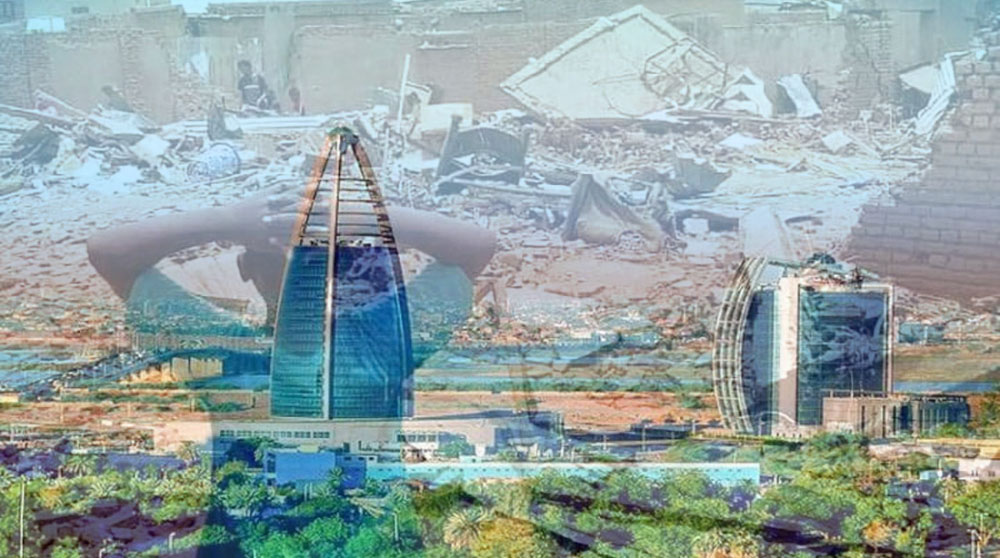
``Nostalgia`` April War
Khaled Masa
As the days of war prolonged and flamed, the Sudanese memory skinned, and many Sudanese found themselves in areas of warfare operations at varying times forced to displace or resort to other places they thought were safe and spared from war.
Khartoum.. Khartoum where they were born and raised... Khartoum they entered from every door.. Khartoum, which narrowed other wars further widened. Khartoum in its form and its current breadth created by the unjust distribution of power and wealth in the Sudan, which emptied all cities in the states impoverished by poor planning and turned the wealth of the Sudanese countryside into an inferno from which citizens flee for treatment, science and a decent living.
Who wants to read about the war, and know precisely what happened to the Sudanese, should see who they are trading on their pages and what social "condolences" platforms offer, which alone have become ropes to continue the collective grief of the Sudanese people, writing about their dead, receiving condolences and writing about their missing people asking for help, writing about their wounds and wounds in the days and wounds.
The Sudanese came out of their cities. From their villages... From their homes, those constructed with cement and velvet or those covered by straw and "sausage" stand on pillars of love.
They all came out in a hurry. They found no lighter souls at the moment of the outbreak of the war, and then they left behind everything to care for the Almighty. "Nests", "Rockets", random alleys of love and persistent livelihoods in Khartoum market ghoul painted with poor siblings.
They came out of the Sumak "architecture" that imported everything from immigration and expatriate capitals, yet they did not lose a corn of their Sudanese. The column of "Pills" tales of children who opened their eyes on Khartoum remained the one who formed their grandparents by searching for "Shilel", who, according to our popular tales, had chosen or eaten the "dodo".
The Sudanese and pine needles write on the skin of their letters that some of those who thought they had survived the war and that they would be safe were all sin.
The Sudanese hanged their lives on the gates of the cities of "displacement", left them there at airports and crossings of "asylum" and went out indefinitely. The war distorted their old memory and mobilized their heads with a new memory with scenes and events they heard about and did not compose.
The war took its weight out and brought out the Sudanese and the bitter salt on their cheeks looking for ways to give them and give their children and souls a "living" and certainly not a "life".
The Sudanese buried their fathers and livers inside the houses and in the streets. Inside the university walls. We buried them blindly. They were buried in a hurry, only by their thickness at the moment of meeting death and their solace ceremony ended with the completion of the burial, which was often without ceremonies, and others buried under the description of "unidentified".
The Sudanese grieve over the departure of the media professor and journalist/Hashim Karar. The Khartoum press did not write "Manchet" condolences. Only those who know his worth of media personnel have established condolences on their interactive pages and include an important page in the Sudanese press.
The Sudanese "hypothetically" hugged each other to the distress of the Sudanese singing chord with the departure of "Bashkat "/Mohammad Amin. His songs recorded their cries on him and he was silenced for the first time to sing all those in the theatre of war.
The Sudanese have not yet left the Virtual Marquee of Solace until their blessings of grief were overcome by the departure of the activist, poet, writer, lawyer/Kamal al-Jizuli. And the dreamers of transitional justice. And... All of them did not prefer war against them, nor did they call it an inch in the countrys soil and a shroud wrapped in the flag of the homeland in which they spent their lives for a decent life.
In the war... The ink of the nation, the flag and the rag of platforms condemning the Sudanese without glory/the ink Yusuf Nur permanent, died as if the war wanted its days to empty Khartoum of its inhabitants, but only of its pillars that made it a capital.
The Sudanese write about the aftermath of the war and have given their backs, chests and even dignity questions about entry procedures, visa requirements and residences in asylum towns, prices for traders of war and crisis conditions, and the injustice of relatives in displacement towns.
They write with composite fractures in Al Khater about signs of places that formed their memory in the streets and cities of Khartoum that were transported by their owners to the cities of displacement and asylum in an attempt to start a new life on the remains of an old memory.

